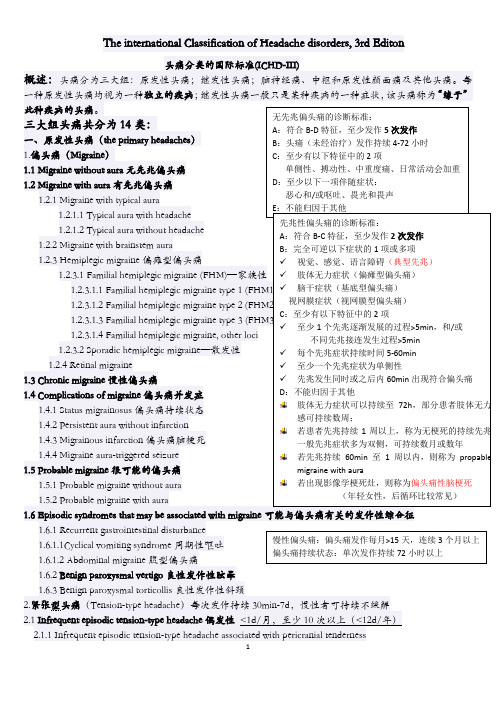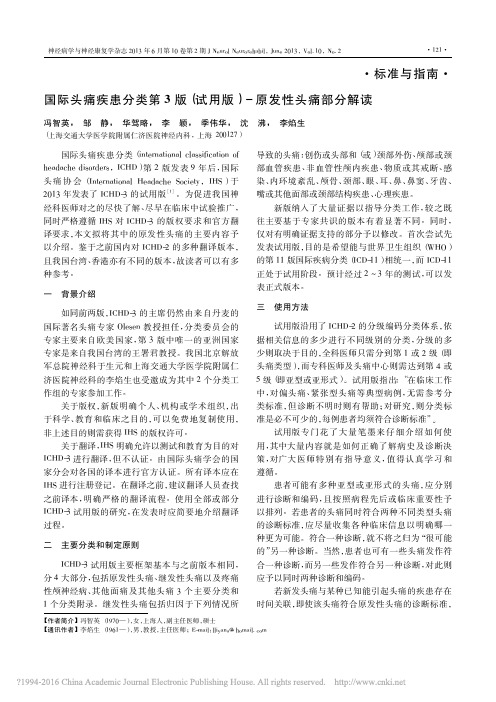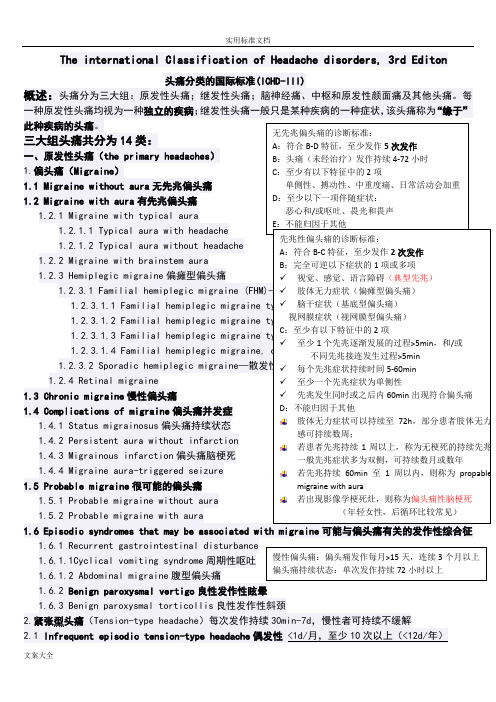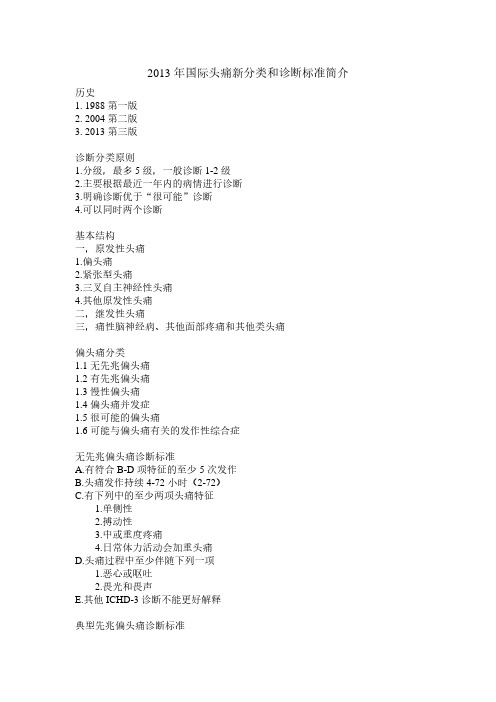头痛地国际分类第三版中文
国际头痛分类(ICHD-Ⅲ)

5分钟连续出现
2.每个先兆症状持续5-60分钟
D头痛满足1.1无先兆偏头痛诊
断标准,且常伴随先兆,或先
兆60分钟内出现
E不能归因于ICHD-3其他诊断
区别:1.由“基底型偏头痛”更
名为“脑干先兆性偏头痛”;2.
1.3与偏头痛可 能相关的儿童周 期性综合症
区别:尽管该类疾病多见于儿 童,但是3版中把年龄(“儿童 ”)从诊断中去掉。
2.1少发发作性 紧缩型头痛
2.1.1少发发作
性紧缩型头痛伴 颅周压痛
2.1.2少发发作
性紧缩型头痛不 伴颅周压痛
2.1少发发作性紧 缩型头痛
2.1.1少发发作
性紧缩型头痛伴 颅周压痛
2.1.2少发发作
性紧缩型头痛不 伴颅周压痛
2.2频发发作性 紧缩型头痛
2.2.1频发发作
性紧缩型头痛伴 颅周压痛
2.3.1慢性紧缩
型头痛伴颅周压 痛
2.3.2慢性紧缩
型头痛不伴颅周 压痛 2.4可能紧缩型头 痛
2.4.1可能少发 A、C同右
2.4.1可能少发
发作性紧缩型头 B发作不满足1.1无先兆偏头痛 发作性紧缩型头
痛
痛
2.4.2可能频发 A、C同右
2.4.2可能频发
发作性紧缩型头 B.发作不满足1.1无先兆偏头痛 发作性紧缩型头
的患者,除了一个或多个先兆 症状持续>1周外,其它与之前 先兆一样 B.不能归因于其它疾病
1.2.3.1.4偏 瘫性偏头痛(其 他位点)
1.5.4偏头痛性 同右 梗死
1.2.3.2散发性 偏瘫性偏头痛
1.5.5偏头痛触 同右 发癫痫发作
1.2.4视网膜型 偏头痛
1.6可能性偏头 同右 痛
头痛的国际分类(第三版)中文

The international Classification of Headache disorders, 3rd Editon头痛分类的国际标准(ICHD-III)概述:头痛分为三大组:原发性头痛;继发性头痛;脑神经痛、中枢和原发性颜面痛及其他头痛。
每一种原发性头痛均视为一种独立的疾病;继发性头痛一般只是某种疾病的一种症状,该头痛称为“缘于”此种疾病的头痛。
三大组头痛共分为14类: 一、原发性头痛(the primary headaches ) 1.偏头痛(Migraine ) 1.1 Migraine without aura 无先兆偏头痛 1.2 Migraine with aura 有先兆偏头痛 1.2.1 Migraine with typical aura 1.2.1.1 Typical aura with headache 1.2.1.2 Typical aura without headache 1.2.2 Migraine with brainstem aura 1.2.3 Hemiplegic migraine 偏瘫型偏头痛1.2.3.1 Familial hemiplegic migraine (FHM)—家族性 1.2.3.1.1 Familial hemiplegic migraine type 1 (FHM1) 1.2.3.1.2 Familial hemiplegic migraine type 2 (FHM2) 1.2.3.1.3 Familial hemiplegic migraine type 3 (FHM3) 1.2.3.1.4 Familial hemiplegic migraine, other loci 1.2.3.2 Sporadic hemiplegic migraine —散发性 1.2.4 Retinal migraine 1.3 Chronic migraine 慢性偏头痛1.4 Complications of migraine 偏头痛并发症1.4.1 Status migrainosus 偏头痛持续状态 1.4.2 Persistent aura without infarction 1.4.3 Migrainous infarction 偏头痛脑梗死 1.4.4 Migraine aura-triggered seizure 1.5 Probable migraine 很可能的偏头痛 1.5.1 Probable migraine without aura1.5.2 Probable migraine with aura 1.6 Episodic syndromes that may be associated with migraine 可能与偏头痛有关的发作性综合征1.6.1 Recurrent gastrointestinal disturbance1.6.1.1Cyclical vomiting syndrome 周期性呕吐 1.6.1.2 Abdominal migraine 腹型偏头痛1.6.2 Benign paroxysmal vertigo 良性发作性眩晕1.6.3 Benign paroxysmal torticollis 良性发作性斜颈2.紧张型头痛(Tension-type headache )每次发作持续30min-7d ,慢性者可持续不缓解2.1 Infrequent episodic tension-type headache 偶发性 <1d/月,至少10次以上(<12d/年)2.1.1 Infrequent episodic tension-type headache associated with pericranial tenderness无先兆偏头痛的诊断标准:A :符合B-D 特征,至少发作5次发作B :头痛(未经治疗)发作持续4-72小时C :至少有以下特征中的2项单侧性、搏动性、中重度痛、日常活动会加重D :至少以下一项伴随症状:恶心和/或呕吐、畏光和畏声E :不能归因于其他 先兆性偏头痛的诊断标准:A :符合B-C 特征,至少发作2次发作B :完全可逆以下症状的1项或多项✓ 视觉、感觉、语言障碍(典型先兆)✓ 肢体无力症状(偏瘫型偏头痛)✓ 脑干症状(基底型偏头痛)视网膜症状(视网膜型偏头痛)C :至少有以下特征中的2项 ✓ 至少1个先兆逐渐发展的过程>5min ,和/或 不同先兆接连发生过程>5min ✓ 每个先兆症状持续时间5-60min✓ 至少一个先兆症状为单侧性✓ 先兆发生同时或之后内60min 出现符合偏头痛 D :不能归因于其他 肢体无力症状可以持续至72h ,部分患者肢体无力感可持续数周; 若患者先兆持续1周以上,称为无梗死的持续先兆一般先兆症状多为双侧,可持续数月或数年 若先兆持续60min 至1周以内,则称为propablemigraine with aura若出现影像学梗死灶,则称为偏头痛性脑梗死 (年轻女性,后循环比较常见) 慢性偏头痛:偏头痛发作每月>15天,连续3个月以上 偏头痛持续状态:单次发作持续72小时以上4.5 Cold-stimulus headache 冷刺激性头痛 4.5.1 Headache attributed to external application of a cold stimulus4.5.2 Headache attributed to ingestion or inhalation of a cold stimulus 4.5.3 Probable cold-stimulus headache4.5.3.1 Headache probably attributed to external application of a cold stimulus4.5.3.2 Headache probably attributed to ingestion or inhalation of a cold stimulus 4.6 External-pressure headache 4.6.1 External-compression headache 4.6.2 External-traction headache 4.6.3 Probable external-pressure headache4.6.3.1 Probable external-compression headache 4.6.3.2 Probable external-traction headache 4.7 Primary stabbing headache4.7.1 Probable primary stabbing headache4.8 Nummular headache4.8.1 Probable nummular headache4.9 Hypnic headache4.9.1 Probable hypnic headache4.10 New daily persistent headache (NDPH) 新症每日持续性头痛4.10.1 Probable new daily persistent headach 二、继发性头痛(the secondary headaches )5.缘于头、颈部外伤的头痛(Headache attributed to trauma or injury to the head and/or neck )5.1 Acute headache attributed to traumatic injury to the head5.1.1 Acute headache attributed to moderate or severe traumatic injury to the head5.1.2 Acute headache attributed to mild traumatic injury to the head5.2 Persistent headache attributed to traumatic injury to the head5.2.1 Persistent headache attributed to moderate or severe traumatic injury to the head5.2.2 Persistent headache attributed to mild traumatic injury to the head5.3 Acute headache attributed to whiplash5.4 Persistent headache attributed to whiplash5.5 Acute headache attributed to craniotomy5.6 Persistent headache attributed to craniotomy6.缘于头颈部血管疾病的头痛(Headache attributed to cranial or cervical vascular disorder )6.1 Headache attributed to ischaemic stroke or transient ischaemic attack6.1.1 Headache attributed to ischaemic stroke (cerebral infarction)6.1.2 Headache attributed to transient ischaemic attack (TIA)6.2 Headache attributed to non-traumatic intracranial haemorrhage6.2.1 Headache attributed to non-traumatic intracerebral haemorrhage 非外伤性脑出血6.2.2 Headache attributed to non-traumatic subarachnoid haemorrhage (SAH)6.2.3 Headache attributed to non-traumatic acute subdural haemorrhage (ASDH)急性硬膜下血肿NDPH 诊断标准: A :持续性头痛,符合B-C 的标准B :Distinct and clearly remembered onset, with pain becomingcontinuous and unremitting within 24 hours C :Present for>3 monthsD :除外其他疾患 慢性头痛,起病急,可清晰回忆发病时间为哪一天 疼痛缺乏特点,可以为偏头痛,可以为紧张性,亦可两者混合 若患者符合慢性偏头痛或慢性紧张型头痛的标准,则不诊断NDPH 若患者为药物过度使用性头痛,且符合NDPH 的标准, 则可两者均可作为诊断6.3 Headache attributed to unruptured vascular malformation 未破裂的血管畸形6.3.1 Headache attributed to unruptured saccular aneurysm囊性动脉瘤6.3.2 Headache attributed to arteriovenous malformation (AVM) 动静脉畸形6.3.3 Headache attributed to dural arteriovenous fistula (DAVF) 硬膜动静脉瘘6.3.4 Headache attributed to cavernous angioma 海绵窦血管瘤6.3.5 Headache attributed to encephalotrigeminal or leptomeningeal angiomatosis (Sturge Weber syndrome) 脑三叉神经或软脑膜血管瘤病6.4 Headache attributed to arteritis6.4.1 Headache attributed to giant cell arteritis (GCA) 颞动脉炎6.4.2 Headache attributed to primary angiitis of the central nervous system (PACNS)6.4.3 Headache attributed to secondary angiitis of the central nervous system (SACNS)颞动脉炎诊断标准:美国风湿学会1990年1. 50岁以上发病:50岁以上发现症状2.新发的头痛:出现新发的局限性头痛3.颞动脉异常:颞动脉压痛或者与颈动脉的动脉硬化无关的搏动减弱4.血沉值升高:50mm/h以上5.动脉活检异常:单核细胞为主的细胞浸润或者伴多核巨细胞的肉芽肿出现为特征的血管炎证据5项中如满足3项以上,敏感度93.5%。
国际头痛分类(ICHD-Ⅲ)

3.3.1.1发作性 SUNCT可能性短 暂单侧神经痛样 头痛发作
3.3.1.2慢性 SUNCT
3.3.2短暂单侧 神经痛样头痛发 作伴头面部自主 神经症状 (SUNA)
3.3.2.1发作性 SUNA
3.3.2.2慢性 SUNA
3.4持续性偏侧头 痛
3.2.2慢性发作 性偏侧头痛
A至少20次满足B-D的发作
B中或重度单侧头痛,伴眶周
、眶上、颞部和/或其他三叉神
经支配区域,持续5-240秒,
发作呈搏动性
C疼痛伴随同侧结膜充血及流
3.3短暂单侧神 经痛样头痛发作
泪 D发作频率每日3 至200 次
3.3短暂单侧神经
伴结膜充血及流 泪(SUNCT)
1.4.2持续先兆 不伴梗死
1.4.3偏头痛性 脑梗
1.4.4偏头痛触 发癫痫发作
1.5可能性偏头痛
1.5.1可能性无先 兆偏头痛 1.5.2可能性有先 兆偏头痛 1.6 与偏头痛可 能相关的周期性 疾病 1.6.1 复发型胃 肠功能障碍
1.6.1.1周期性 呕吐综合征
1.6.1.2腹型偏 头痛
B突然发生,持续1秒到30分钟
C同右
D同右
4.1.1可能的原发
区别:持续时间:2版持续时 性咳嗽头痛
间为1秒到30秒,3版持续时间
为1秒到2小时
4.3原发性奋力 头痛
A满足B和C的搏动性头痛 B持续时间为5分钟到48小时 C只在剧烈的运动中或运动后 发生 D同右
4.2 原发性运动 头痛
区别:2版中提到头痛性质为 搏动性;持续时间2版为5分钟 到48小时,3版为小于48小时
3.三叉自主神经 性头面痛 (TACs)
类下
3.1丛集性头痛
国际头痛疾患分类第3版_试用版_原发性头痛部分解读_冯智英

神经病学与神经康复学杂志 2013 年 6 月第 10 卷第 2 期 J Neurol Neurorehabil,June 2013,Vol. 10,No. 2
·123·
偏头痛双侧 更 为 常 见,偏 侧 头 痛 多 始 于 青 年 或 成 年 早期。偏头 痛 的 头 痛 常 位 于 额 和 颞 部,儿 童 枕 部 头 痛极罕见,诊 断 时 需 谨 慎。 有 些 其 他 表 现 典 型 的 患 者 的 疼 痛 位 于 颜 面 部,在 文 献 中 称 为‘颜 面 性 偏 头 痛’,没有证 据 提 示 这 些 患 者 为 独 立 的 偏 头 痛 亚 型。 在年幼儿 童,可 从 其 行 为 推 断 有 畏 光 和 畏 声。 偏 头 痛发作可伴随有头部自主神经症状和皮肤异常疼痛 ( allodynia) 症状。
神经病学与神经康复学杂志 2013 年 6 月第 10 卷第 2 期 J Neurol Neurorehabil,June 2013,Vol. 10,No. 2
·121·
·标准与指南·
国际头痛疾患分类第 3 版( 试用版) - 原发性头痛部分解读
冯智英, 邹 静, 华驾略, 李 颖, 季伟华, 沈 沸, 李焰生
关于继发性头痛,受篇幅限制,各章节只列出了 最常见及 研 究 最 充 分 的 病 因,而 非 所 有 病 因。 继 发 性头痛的诊断不再要求潜在病因缓解或明显改善后 方能做出。ICHD-3 测试版中,只要潜在疾患存在或 一经确认即可做出诊断。继发性头痛的诊断标准基 本包括头痛临床表现、病因、两者存在因果关系的证 据,但最重要也是临床最难操作的是,所有情况下都 必须符合最 后 一 条 诊 断 标 准,即 不 能 更 好 地 由 另 一 种 ICHD-3 诊断来解释。
头痛分类和诊断标准

头痛分类和诊断标准
头痛是指头部疼痛的一种症状。
根据头痛的类型可分为偏头痛、
紧张型头痛、群集性头痛、颈源性头痛、三叉神经痛等多种类型。
诊断头痛需要考虑头痛的持续时间、出现频率、头痛的性质、伴
随症状等多个方面。
最常用的头痛分类标准为国际头痛协会(International Headache Society)的ICHD-3(2018年版)。
其中,对偏头痛的诊断标准包括:具有至少两次发作;头痛时间为4-72小时;头痛为脉博性且中度或重度;伴随恶心、呕吐、光过敏和/或声音过敏。
紧张型头痛的诊断标准为:头痛时间长达30分钟至7天;头痛
为双侧性、轻至中度;头部或颈部肌肉紧张或触痛。
群集性头痛的特点是疼痛剧烈、持续时间短,常伴随流泪、鼻塞
等症状。
其诊断标准包括:剧烈头痛出现在同一侧,时间为15-180分钟;发作数量每天至少5次,每次发作间隔为1-8小时;在发作期间
伴随自主神经症状。
颈源性头痛主要来源于颈部结构,可由颈椎病变、颈肌痉挛等引起。
其诊断标准为反复发作的头痛,且头痛起源于颈部,或头痛伴随
颈部不适。
三叉神经痛的诊断标准为突发的、剧烈的疼痛,常局限于三叉神
经分布区域。
国际头痛疾患分类第3版_试用版_原发性头痛部分解读_冯智英

试用版沿用了 ICHD-2 的分级编码分类体系,依 据相关信息 的 多 少 进 行 不 同 级 别 的 分 类,分 级 的 多 少则取决于目的,全科医师只需分到第 1 或 2 级( 即 头痛类型) ,而专科医师及头痛中心则需达到第 4 或 5 级( 即亚型或亚形式) 。试用版指出: “在临床工作 中,对 偏 头 痛、紧 张 型 头 痛 等 典 型 病 例,无 需 参 考 分 类标准,但诊断不明时则有帮助; 对研究,则分类标 准是必不可少的,每例患者均须符合诊断标准”。
神经病学与神经康复学杂志 2013 年 6 月第 10 卷第 2 期 J Neurol Neurorehabil,June 2013,Vol. 10,No. 2
·123·
偏头痛双侧 更 为 常 见,偏 侧 头 痛 多 始 于 青 年 或 成 年 早期。偏头 痛 的 头 痛 常 位 于 额 和 颞 部,儿 童 枕 部 头 痛极罕见,诊 断 时 需 谨 慎。 有 些 其 他 表 现 典 型 的 患 者 的 疼 痛 位 于 颜 面 部,在 文 献 中 称 为‘颜 面 性 偏 头 痛’,没有证 据 提 示 这 些 患 者 为 独 立 的 偏 头 痛 亚 型。 在年幼儿 童,可 从 其 行 为 推 断 有 畏 光 和 畏 声。 偏 头 痛发作可伴随有头部自主神经症状和皮肤异常疼痛 ( allodynia) 症状。
无先兆偏头痛常与月经有关。ICHD-3 试用版给 出了 A1. 1. 1 单纯月经性偏头痛和 A1. 1. 2 月经相关 性偏头痛的 诊 断 标 准,但 由 于 不 能 确 定 它 们 是 否 应 视作单独的疾病实体而列在附录中。
非常频繁 的 偏 头 痛 发 作 现 归 为 1. 3 慢 性 偏 头 痛。当与药物过度使用有关时,则应同时诊断为 1. 3 慢性偏头痛和 8. 2 药物过度使用性头痛。当频繁使 用症状性药物治疗时,1. 1 无先兆偏头痛是最易于导 致频繁使用对症药物的情况。
头痛分类的国际标准

头痛分类的国际标准按照头痛分类的国际标准( ICHD-III)的分类标准,临床上头痛一共有14种类型,每种类型又包含若干种头痛。
偏头痛▎概述临床最常见的原发性头痛,人群中患病率高达5%-10%,也就是说在中国有至少有6500万的患者。
头痛发作位置大多如图所示,疼痛为中重度搏动样头痛,可持续4-72小时,非常影响患者生活。
▎诱因偏头痛的诱因非常复杂,据美国流行病调查统计,大约70%-80%的患者有家族史,同时外界因素(声、光刺激等)和生活规律(食物、睡眠、压力等)也可能引发偏头痛。
▎治疗因此对偏头痛的治疗方案也较多,如果考虑针对病因的治疗,可以让患者记录下每次发作的时间、地点和状况,以便分析其诱因。
针对中轻度头痛,一般治疗可单用非特异性止痛药,如非甾体类消炎药(对乙酰氨基酚、萘普生、布洛芬等)。
对中重度头痛,可选用偏头痛特异性治疗药物如麦角类制剂和曲谱坦类药物。
由于这两类药物有强烈的血管收缩作用,并且长期大量使用可引起严重不良后果,因此,对于以往服用非甾体类消炎药(NSAIDs)效果较好的中重度头痛患者,可以继续给予NSAIDs类药物。
由于偏头痛诱因复杂,部分患者可建议进行心理疏导,对于慢性长期性偏头痛,美国有研究者认为认知行为治疗也是可行的替代方案。
丛集性头痛▎概述此病之所以得这么个名字,是因为它的疼痛成群结队而来,表现为一连串的密集的非搏动性剧痛。
丛集性期长达2周至3个月,每次发作持续15-180分钟。
位置如图,在一侧眼眶或额颞部。
发作时患者坐立不安,部分患者甚至会用拳击打头部以减轻疼痛。
此病发病率比偏头痛较少,近6.8/10万。
▎诱因丛集性头痛一般无家族史,可由饮酒、吸烟、缺氧、热度或高海拔等因素诱发。
其病因尚不明确,一般认为是颅内、外血管扩张导致。
Horton认为与组胺释放有关。
▎治疗对于安定类药物效果不佳的丛集性头痛可给予吸氧(100%氧气8-10L/min,10-15分钟)。
曲普坦类药物可以迅速缓解头痛。
头痛地国际分类(第三版)中文

The international Classification of Headache disorders, 3rd Editon4.6.3.2 Probable external-traction headache 4.7.1 Probable primary stabbing headache6.2 Headache attributed to non-traumatic intracranial haemorrhage6.2.1 Headache attributed to non-traumatic intracerebral haemorrhage非外伤性脑出血6.2.2 Headache attributed to non-traumatic subarachnoid haemorrhage (SAH)6.2.3 Headache attributed to non-traumatic acute subdural haemorrhage (ASDH)急性硬膜下血肿6.3 Headache attributed to unruptured vascular malformation未破裂的血管畸形6.3.1 Headache attributed to unruptured saccular aneurysm囊性动脉瘤6.3.2 Headache attributed to arteriovenous malformation (AVM) 动静脉畸形6.3.3 Headache attributed to dural arteriovenous fistula (DAVF) 硬膜动静脉瘘6.3.4 Headache attributed to cavernous angioma 海绵窦血管瘤6.3.5 Headache attributed to encephalotrigeminal or leptomeningeal angiomatosis (Sturge Weber syndrome)脑三叉神经或软脑膜血管瘤病6.4 Headache attributed to arteritis6.4.1 Headache attributed to giant cell arteritis (GCA) 颞动脉炎6.4.2 Headache attributed to primary angiitis of the central nervous system (PACNS)6.4.3 Headache attributed to secondary angiitis of the central nervous system (SACNS)6.8.2 Mitochondrial Encephalopathy, Lactic Acidosis and Stroke-like episodes (MELAS)6.8.3 Headache attributed to another genetic vasculopathy6.9 Headache attributed to pituitary apoplexy垂体卒中7.缘于非血管性颅内疾病的头痛(Headache attributed to non-vascular intracranial disorder )7.1 Headache attributed to increased cerebrospinal fluid pressure颅内压增高7.1.1 Headache attributed to idiopathic intracranial hypertension (IIH)7.1.2 Headache attributed to intracranial hypertension secondary to metabolic, toxic or hormonal causes7.1.3 Headache attributed to intracranial hypertension secondary to hydrocephalus7.2 Headache attributed to low cerebrospinal fluid pressure颅内压低下7.2.1 Post-dural puncture headache腰穿后7.2.2 CSF fistula headache脑脊液漏7.2.3 Headache attributed to spontaneous intracranial hypotension自发性低颅压7.3 Headache attributed to non-infectious inflammatory disease非感染性炎性疾病7.3.1 Headache attributed to neurosarcoidosis7.3.2 Headache attributed to aseptic (non-infectious) meningitis7.3.3 Headache attributed to other non-infectious inflammatory disease7.3.4 Headache attributed to lymphocytic hypophysitis7.3.5 Syndrome of transient Headache and Neurological Deficits with cerebrospinal fluid Lymphocytosis (HaNDL)7.4 Headache attributed to intracranial neoplasia颅内新生物7.4.1 Headache attributed to intracranial neoplasm7.4.1.1 Headache attributed to colloid cyst of the third ventricle7.4.2 Headache attributed to carcinomatous meningitis癌性脑膜炎7.4.3 Headache attributed to hypothalamic or pituitary hyper- or hyposecretion7.5 Headache attributed to intrathecal injection鞘内注射7.6 Headache attributed to epileptic seizure7.6.1 Hemicrania epileptica癫痫半颅痛7.6.2 Post-ictal headache癫痫发作后头痛7.7 Headache attributed to Chiari malformation type I (CM1)7.8 Headache attributed to other non-vascular intracranial disorder8.缘于物质或物质戒断的头痛(Headache attributed to a substance or its withdrawal)8.1 Headache attributed to use of or exposure to a substance or its withdrawal缘于某种物质的应用或戒断8.1.1 Nitric oxide (NO) donor-induced headache一氧化氮诱发8.1.1.1 Immediate NO donor-induced headache8.1.1.2 Delayed NO donor-induced headache8.1.2 Phosphodiesterase (PDE) inhibitor-induced headache磷酸二酯酶抑制剂8.1.3 Carbon monoxide (CO)-induced headache一氧化碳诱发8.1.4 Alcohol-induced headache酒精诱发8.3.4 Headache attributed to withdrawal from chronic use of other substance9.缘于感染的头痛(Headache attributed to infection)9.1 Headache attributed to intracranial infection颅内感染9.1.1 Headache attributed to bacterial meningitis or meningoencephalitis细菌性脑膜炎/脑膜脑炎9.1.1.1 Acute headache attributed to bacterial meningitis or meningoencephalitis9.1.1.2 Chronic headache attributed to bacterial meningitis or meningoencephalitis9.1.1.3 Persistent headache attributed to past bacterial meningitis or meningoencephalitis9.1.2 Headache attributed to viral meningitis or encephalitis病毒性脑膜炎或脑炎9.1.2.1 Headache attributed to viral meningitis9.1.2.2 Headache attributed to viral encephalitis9.1.3 Headache attributed to intracranial fungal or other parasitic infection真菌或寄生虫感染9.1.3.1 Acute headache attributed to intracranial fungal or other parasitic infection9.1.3.2 Chronic headache attributed to intracranial fungal or other parasitic infection9.1.4 Headache attributed to brain abscess脑脓肿9.1.5 Headache attributed to subdural empyema硬膜下积脓9.2 Headache attributed to systemic infection系统感染9.2.1 Headache attributed to systemic bacterial infection系统细菌感染9.2.1.1 Acute headache attributed to systemic bacterial infection9.2.1.2 Chronic headache attributed to systemic bacterial infection9.2.2 Headache attributed to systemic viral infection系统病毒感染9.2.2.1 Acute headache attributed to systemic viral infection9.2.2.2 Chronic headache attributed to systemic viral infection9.2.3 Headache attributed to other systemic infection其他系统感染9.2.3.1 Acute headache attributed to other systemic infection9.2.3.2 Chronic headache attributed to other systemic infection10.缘于内环境紊乱的头痛(Headache attributed to disorder of homoeostasis)10.1 Headache attributed to hypoxia and/or hypercapnia缺氧和/或高碳酸血症10.1.1 High-altitude headache高海拔头痛10.1.2 Headache attributed to aeroplane travel飞行头痛10.1.3 Diving headache潜水头痛10.1.4 Sleep apnoea headache睡眠呼吸暂停性头痛10.2 Dialysis headache10.3 Headache attributed to arterial hypertension高血压性头痛10.3.1 Headache attributed to phaeochromocytoma嗜络细胞瘤10.3.2 Headache attributed to hypertensive crisis without hypertensive encephalopathy无高血压脑病的高血压危象10.3.3 Headache attributed to hypertensive encephalopathy高血压脑病10.3.4 Headache attributed to pre-eclampsia or eclampsia先兆子痫10.3.5 Headache attributed to autonomic dysreflexia自主反射障碍10.4 Headache attributed to hypothyroidism甲状腺低下10.5 Headache attributed to fasting禁食10.6 Cardiac cephalalgia心源性头痛10.7 Headache attributed to other disorder of homoeostasis其他内环境稳定失调疾患11.缘于头、颈、眼、耳、鼻、鼻窦、牙、口或其他头面部结构病变的头面痛(Headache or facial pain attributed to disorder of the cranium, neck,eyes, ears, nose, sinuses, teeth, mouth or other facial or cervical structure )11.1 Headache attributed to disorder of cranial bone颅骨11.2 Headache attributed to disorder of the neck 颈部11.2.1 Cervicogenic headache11.2.2 Headache attributed to retropharyngeal tendonitis11.2.3 Headache attributed to craniocervical dystonia11.3 Headache attributed to disorder of the eyes眼睛11.3.1 Headache attributed to acute glaucoma急性青光眼11.3.2 Headache attributed to refractive error屈光不正11.3.3 Headache attributed to heterophoria or heterotropia (latent or persistent squint)斜视11.3.4 Headache attributed to ocular inflammatory disorder11.3.5 Headache attributed to trochleitis11.4 Headache attributed to disorder of the ears耳朵11.5 Headache attributed to disorder of the nose or paranasal sinuses鼻子或鼻窦11.5.1 Headache attributed to acute rhinosinusitis急性鼻窦炎11.5.2 Headache attributed to chronic or recurring rhinosinusitis11.6 Headache attributed to disorder of the teeth or jaw11.7 Headache attributed to temporomandibular disorder (TMD)11.8 Head or facial pain attributed to inflammation of the stylohyoid ligament11.9 Headache or facial pain attributed to other disorder of cranium, neck, eyes, ears, nose,sinuses, teeth, mouth or other facial or cervical structure12.缘于精神疾病的头痛(Headache attributed to psychiatric disorder)12.1 Headache attributed to somatization disorder躯体化障碍12.2 Headache attributed to psychotic disorder精神疾病三、脑神经痛、中枢和原发性颜面痛及其他头痛(painful cranial neuropathies, other facial pains and other headaches)13.脑神经痛和中枢性颜面痛(Painful cranial neuropathies and other facial pains)13.1 Trigeminal neuralgia三叉神经痛13.1.1 Classical trigeminal neuralgia13.1.1.1 Classical trigeminal neuralgia, purely paroxysmal13.1.1.2 Classical trigeminal neuralgia with concomitant persistent facial pain。
国际头痛分类3-beta

23
©International Headache Society 2013/4
1.2.1.1伴头痛的典型先兆
A. 满足1.2.1. 典型先兆偏头痛的标准 B.伴随先兆或先兆后60min内发生具有或不具有 偏头痛特征的头痛
1. 偏头痛
1.1 无先兆偏头痛 1.2 先兆偏头痛 1.3 慢性偏头痛 1.4 偏头痛并发症 1.5 很可能偏头痛 1.6 可能与偏头痛相关的发作综合症
ICHD-3 beta. Cephalalgia 2013; 33: 629–808
16
©International Headache Society 2013/4
7
©International Headache Society 2013/4
结构
最后一章(第14章)
不属于现存分类的头痛:头痛有待描述 特性不明的头痛:很显然地,有很多病人必须 在资料很有限的情况下作诊断,我们只能说他 们现有或曾有头痛,但无法去区分头痛类型。 这些病人就编码归类为 14.2 特性不明的头痛。 然而,这个分类不应在可获得资料的情况下, 作为不愿去取得头痛详细资料的借口。它只有 在病人死亡、无法沟通或无法得到资料时使 用。
ICHD-3 beta. Cephalalgia 2013; 33: 629–808
22
©International Headache Society 2013/4
1.2.1典型先兆偏头痛
A.至少有2 次符合标准B 和C 的发作 B.先兆包括视觉、感觉和(或)言语/语言症状,均完全 可逆,但不包括运动、脑干或视网膜症状 C. 下列4 项特征中至少有2项: ①至少1种先兆症状逐渐进展≥5min和(或)两种或更 多的症状相继出现; ②每种先兆症状持续5~60min; ③至少1种先兆症状是单侧的; ④先兆伴随头痛或在先兆发生60min内发生头痛 D. 没有另一个ICHD-3 的诊断能更好地解释,短暂性 缺血发作已被排除
国际头痛新分类和诊断标准简介

2013年国际头痛新分类和诊断标准简介历史1. 1988第一版2. 2004第二版3. 2013第三版诊断分类原则1.分级,最多5级,一般诊断1-2级2.主要根据最近一年内的病情进行诊断3.明确诊断优于“很可能”诊断4.可以同时两个诊断基本结构一,原发性头痛1.偏头痛2.紧张型头痛3.三叉自主神经性头痛4.其他原发性头痛二,继发性头痛三,痛性脑神经病、其他面部疼痛和其他类头痛偏头痛分类1.1无先兆偏头痛1.2有先兆偏头痛1.3慢性偏头痛1.4偏头痛并发症1.5很可能的偏头痛1.6可能与偏头痛有关的发作性综合症无先兆偏头痛诊断标准A.有符合B-D项特征的至少5次发作B.头痛发作持续4-72小时(2-72)C.有下列中的至少两项头痛特征1.单侧性2.搏动性3.中或重度疼痛4.日常体力活动会加重头痛D.头痛过程中至少伴随下列一项1.恶心或呕吐2.畏光和畏声E.其他ICHD-3诊断不能更好解释典型先兆偏头痛诊断标准A.有符合B-C项的至少2次发作B.先兆由视觉、感觉或言语症状组成,每种先兆完全可逆,没有运动、脑干及视网膜症状C.至少符合下列4项中的2项1.至少一种先兆症状逐渐发展的过程≥5分钟,或两种或多种先兆症状接连发生2.每种先兆症状持续5-60分钟3.至少一种先兆症状是单侧的4.先兆时伴有头痛或在先兆发生后60分钟内出现头痛D.其他ICHD-3诊断不能更好解释,且已排除短暂性脑缺血发作脑干先兆偏头痛诊断标准A.有符合B-D项的至少2次发作B.先兆由视觉、感觉或言语症状组成,每种先兆完全可逆,没有运动及视网膜症状C.至少符合下列脑干症状中的2项1.构音障碍2.眩晕3.耳鸣4.听觉迟钝5.复视6.共济失调7.意识水平下降D.至少符合下列4项中的2项1.至少一种先兆症状逐渐发展的过程≥5分钟,或两种或多种先兆症状接连发生2.每种先兆症状持续5-60分钟3.至少一种先兆症状是单侧的4.先兆时伴有头痛或在先兆发生后60分钟内出现头痛E.其他ICHD-3诊断不能更好解释,且已排除短暂性脑缺血发作偏瘫性偏头痛诊断标准A.有符合B-C项的至少2次发作B.先兆包括下列全部两种症状1.完全可逆的运动无力2.完全可逆的视觉、感觉或言语症状C.至少符合下列4项中的2项1.至少一种先兆症状逐渐发展的过程≥5分钟,或两种或多种先兆症状接连发生2.每种非运动先兆症状持续5-60分钟,运动症状持续<72小时3.至少一种先兆症状是单侧的4.先兆时伴有头痛或在先兆发生后60分钟内出现头痛D.其他ICHD-3诊断不能更好解释,且已排除短暂性脑缺血发作和卒中可能慢性偏头痛诊断标准A.至少有3个月头痛发作每月≥15天,并且符合B,C标准B.至少有5次发作符合1.1无先兆偏头痛标准的B-D项或1.2有先兆偏头痛标准的B-C项C.至少有3个月每月≥8天头痛符合下列的任何一项1. 1.1无先兆偏头痛标准的C和D项2. 1.2有先兆偏头痛标准的B和C项3. 头痛开始时患者本人认为是偏头痛,且头痛在使用曲普坦类或麦角胺类药物后缓解D.其他ICHD-3诊断不能更好解释很可能的偏头痛紧张型头痛分类2.1偶发性紧张型头痛2.2频发性紧张型头痛2.3慢性紧张型头痛2.4很可能的紧张型头痛偶发性紧张型头痛诊断标准A.有符合标准B-D的至少10次发作,平均每月头痛发作不到1天(每年头痛<12天)B.持续30分钟-7天C.至少符合下列四项中的两项1.双侧性2.压迫或紧缩性3.轻中度4.不会因为日常体力活动加重D.符合下列两项1.无恶心和呕吐2.无畏光和畏声,或仅有其中之一E.其他ICHD-3诊断不能更好解释频发性紧张型头痛诊断标准A.有符合标准B-D的至少10次发作,至少3个月每月头痛发作1-14天(每年头痛≥12天,<180天)B.持续30分钟-7天C.至少符合下列四项中的两项1.双侧性2.压迫或紧缩性3.轻中度4.不会因为日常体力活动加重D.符合下列两项1.无恶心和呕吐2.无畏光和畏声,或仅有其中之一E.其他ICHD-3诊断不能更好解释慢性紧张型头痛诊断标准A.有符合标准B-D的至少10次发作,至少3个月每月头痛发作≥15天(每年头痛≥180天)B.持续数小时或数天或持续不断C.至少符合下列四项中的两项1.双侧性2.压迫或紧缩性3.轻中度4.不会因为日常体力活动加重D.符合下列两项1.无畏光、畏声及轻度恶心症状,或仅有其中之一2.无中重度恶心和呕吐E.其他ICHD-3诊断不能更好解释三叉自主神经性头痛分类3.1丛集性头痛3.2阵发性偏侧头痛3.3短时单侧神经痛样头痛发作3.4持续性偏侧头痛3.5很可能的三叉自主神经性头痛丛集性头痛诊断标准A.符合B-D项特征的至少5次发作B.重度或极重度偏侧眶部、眶上或颞部疼痛,疼痛持续15-180分钟C.符合下列一项或两项1.在头痛侧至少有下列一项a.结膜充血或流泪b.鼻塞或流涕c.眼睑水肿d.前额和面部出汗e.前额和面部发红f.感觉耳部胀满g.瞳孔缩小或眼睑下垂2.感觉不安或躁动D.疾病活动期过半数时间头痛发作频率在隔日一次到每日8次之间E.其他ICHD-3诊断不能更好解释。
- 1、下载文档前请自行甄别文档内容的完整性,平台不提供额外的编辑、内容补充、找答案等附加服务。
- 2、"仅部分预览"的文档,不可在线预览部分如存在完整性等问题,可反馈申请退款(可完整预览的文档不适用该条件!)。
- 3、如文档侵犯您的权益,请联系客服反馈,我们会尽快为您处理(人工客服工作时间:9:00-18:30)。
The international Classification of Headache disorders, 3rd Editon 头痛分类的国际标准(ICHD-III)概述:头痛分为三大组:原发性头痛;继发性头痛;脑神经痛、中枢和原发性颜面痛及其他头痛。
每一种原发性头痛均视为一种独立的疾病;继发性头痛一般只是某种疾病的一种症状,该头痛称为“缘于”此种疾病的头痛。
三大组头痛共分为14类: 一、原发性头痛(the primary headaches ) 1.偏头痛(Migraine ) 1.1 Migraine without aura 无先兆偏头痛 1.2 Migraine with aura 有先兆偏头痛 1.2.1 Migraine with typical aura1.2.1.1 Typical aura with headache 1.2.1.2 Typical aura without headache 1.2.2 Migraine with brainstem aura 1.2.3 Hemiplegic migraine 偏瘫型偏头痛1.2.3.1 Familial hemiplegic migraine (FHM)—家族性 1.2.3.1.1 Familial hemiplegic migraine type 1 (FHM1)1.2.3.1.2 Familial hemiplegic migraine type 2 (FHM2)1.2.3.1.3 Familial hemiplegic migraine type 3 (FHM3) 1.2.3.1.4 Familial hemiplegic migraine, other loci 1.2.3.2 Sporadic hemiplegic migraine —散发性 1.2.4 Retinal migraine 1.3 Chronic migraine 慢性偏头痛1.4 Complications of migraine 偏头痛并发症1.4.1 Status migrainosus 偏头痛持续状态 1.4.2 Persistent aura without infarction 1.4.3 Migrainous infarction 偏头痛脑梗死 1.4.4 Migraine aura-triggered seizure 1.5 Probable migraine 很可能的偏头痛 1.5.1 Probable migraine without aura1.5.2 Probable migraine with aura 1.6 Episodic syndromes that may be associated with migraine 可能与偏头痛有关的发作性综合征1.6.1 Recurrent gastrointestinal disturbance1.6.1.1Cyclical vomiting syndrome 周期性呕吐 1.6.1.2 Abdominal migraine 腹型偏头痛1.6.2 Benign paroxysmal vertigo 良性发作性眩晕1.6.3 Benign paroxysmal torticollis 良性发作性斜颈2.紧张型头痛(Tension-type headache )每次发作持续30min-7d ,慢性者可持续不缓解2.1 Infrequent episodic tension-type headache 偶发性 <1d/月,至少10次以上(<12d/年)2.1.1 Infrequent episodic tension-type headache associated with pericranial tenderness无先兆偏头痛的诊断标准:A :符合B-D 特征,至少发作5次发作B :头痛(未经治疗)发作持续4-72小时C :至少有以下特征中的2项单侧性、搏动性、中重度痛、日常活动会加重D :至少以下一项伴随症状:恶心和/或呕吐、畏光和畏声E :不能归因于其他 先兆性偏头痛的诊断标准:A :符合B-C 特征,至少发作2次发作B :完全可逆以下症状的1项或多项✓ 视觉、感觉、语言障碍(典型先兆)✓ 肢体无力症状(偏瘫型偏头痛)✓ 脑干症状(基底型偏头痛) 视网膜症状(视网膜型偏头痛) C :至少有以下特征中的2项 ✓ 至少1个先兆逐渐发展的过程>5min ,和/或 不同先兆接连发生过程>5min ✓ 每个先兆症状持续时间5-60min✓ 至少一个先兆症状为单侧性✓ 先兆发生同时或之后内60min 出现符合偏头痛 D :不能归因于其他 肢体无力症状可以持续至72h ,部分患者肢体无力感可持续数周; 若患者先兆持续1周以上,称为无梗死的持续先兆一般先兆症状多为双侧,可持续数月或数年若先兆持续60min 至1周以内,则称为propablemigraine with aura若出现影像学梗死灶,则称为偏头痛性脑梗死 (年轻女性,后循环比较常见) 慢性偏头痛:偏头痛发作每月>15天,连续3个月以上偏头痛持续状态:单次发作持续72小时以上4.3.1 Probable primary headache associated with sexual activity 4.4 Primary thunderclap headache 原发性霹雳头痛 4.5 Cold-stimulus headache 冷刺激性头痛 4.5.1 Headache attributed to external application of a cold stimulus4.5.2 Headache attributed to ingestion or inhalation of a cold stimulus4.5.3 Probable cold-stimulus headache 4.5.3.1 Headache probably attributed to external application of a cold stimulus4.5.3.2 Headache probably attributed to ingestion or inhalation of a cold stimulus4.6 External-pressure headache 4.6.1 External-compression headache 4.6.2 External-traction headache 4.6.3 Probable external-pressure headache4.6.3.1 Probable external-compression headache4.6.3.2 Probable external-traction headache 4.7 Primary stabbing headache 4.7.1 Probable primary stabbing headache 4.8 Nummular headache 4.8.1 Probable nummular headache4.9 Hypnic headache4.9.1 Probable hypnic headache4.10 New daily persistent headache (NDPH) 新症每日持续性头痛4.10.1 Probable new daily persistent headach 二、继发性头痛(the secondary headaches )5.缘于头、颈部外伤的头痛(Headache attributed to trauma or injury to the head and/or neck )5.1 Acute headache attributed to traumatic injury to the head5.1.1 Acute headache attributed to moderate or severe traumatic injury to the head5.1.2 Acute headache attributed to mild traumatic injury to the head5.2 Persistent headache attributed to traumatic injury to the head5.2.1 Persistent headache attributed to moderate or severe traumatic injury to the head5.2.2 Persistent headache attributed to mild traumatic injury to the head5.3 Acute headache attributed to whiplash5.4 Persistent headache attributed to whiplash5.5 Acute headache attributed to craniotomy5.6 Persistent headache attributed to craniotomy6.缘于头颈部血管疾病的头痛(Headache attributed to cranial or cervical vascular disorder )6.1 Headache attributed to ischaemic stroke or transient ischaemic attack6.1.1 Headache attributed to ischaemic stroke (cerebral infarction)6.1.2 Headache attributed to transient ischaemic attack (TIA)6.2 Headache attributed to non-traumatic intracranial haemorrhage6.2.1 Headache attributed to non-traumatic intracerebral haemorrhage 非外伤性脑出血6.2.2 Headache attributed to non-traumatic subarachnoid haemorrhage (SAH)NDPH 诊断标准:A :持续性头痛,符合B-C 的标准B :Distinct and clearly remembered onset, with pain becomingcontinuous and unremitting within 24 hours C :Present for>3 months D :除外其他疾患慢性头痛,起病急,可清晰回忆发病时间为哪一天 疼痛缺乏特点,可以为偏头痛,可以为紧张性,亦可两者混合若患者符合慢性偏头痛或慢性紧张型头痛的标准,则不诊断NDPH 若患者为药物过度使用性头痛,且符合NDPH 的标准, 则可两者均可作为诊断6.2.3 Headache attributed to non-traumatic acute subdural haemorrhage (ASDH)急性硬膜下血肿6.3 Headache attributed to unruptured vascular malformation未破裂的血管畸形6.3.1 Headache attributed to unruptured saccular aneurysm囊性动脉瘤6.3.2 Headache attributed to arteriovenous malformation (AVM) 动静脉畸形6.3.3 Headache attributed to dural arteriovenous fistula (DAVF) 硬膜动静脉瘘6.3.4 Headache attributed to cavernous angioma 海绵窦血管瘤6.3.5 Headache attributed to encephalotrigeminal or leptomeningeal angiomatosis (Sturge Weber syndrome)脑三叉神经或软脑膜血管瘤病6.4 Headache attributed to arteritis6.4.1 Headache attributed to giant cell arteritis (GCA) 颞动脉炎6.4.2 Headache attributed to primary angiitis of the central nervous system (PACNS)6.4.3 Headache attributed to secondary angiitis of the central nervous system (SACNS)颞动脉炎诊断标准:美国风湿学会1990年1. 50岁以上发病:50岁以上发现症状2.新发的头痛:出现新发的局限性头痛3.颞动脉异常:颞动脉压痛或者与颈动脉的动脉硬化无关的搏动减弱4.血沉值升高:50mm/h以上5.动脉活检异常:单核细胞为主的细胞浸润或者伴多核巨细胞的肉芽肿出现为特征的血管炎证据5项中如满足3项以上,敏感度93.5%。
